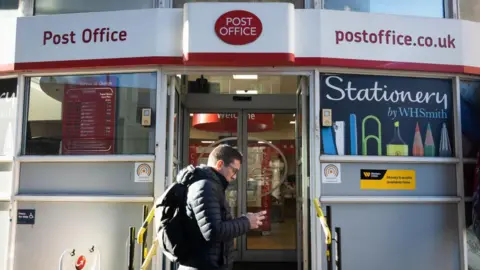
 Getty Images
Getty ImagesUp to 115 Post Office branches and hundreds of head office jobs are at risk as part of a radical shake-up of the business.
The Post Office is looking at options for its wholly-owned branches, which currently employ about 1,000 workers and are loss-making.
These could include alternative franchise arrangements where another operator like retailer WHSmith or another third party could take on the branches.
The Communication Workers Union (CWU) said that for the company to propose such plans as the public inquiry into the Horizon IT scandal continues was “immoral” and “tone deaf”.
The Post Office, which is owned by the government, has 11,500 branches across the UK, most of which are franchises.
Of this number, 115 are Crown Post Offices, larger branches usually found on High Streets and staffed by Post Office employees.
The strategic review, led by the Post Office’s new chairman Nigel Railton, is designed to fundamentally change how the organisation operates.
It aims to put the business on a firmer financial footing, but it comes as the troubled organisation remains the subject of a long-running inquiry into the Horizon scandal.
Between 1999 and 2015, hundreds of sub-postmasters were wrongly prosecuted after faulty computer software made it appear money was missing from their accounts.
The inquiry is in its final week of evidence, more than two and a half years since it started hearings in public.
‘A new deal’
Mr Railton told sub-postmasters on Wednesday that a “new deal” was needed to put them at the “heart of this business”.
The former boss of Camelot was appointed interim chairman of the Post Office after his predecessor Henry Staunton was sacked in January.
He described the Post Office as an organisation that was in need of “a fresh start, and urgently”.
The organisation faces a host of challenges, such as fewer people sending letters, the rise of online shopping, with revenues for its branches being hit as a result.
Today, nearly half of branches are not profitable or only make a small profit from the Post Office element of the business.
Mr Railton said that the plans set out would provide more than £250m each year to postmasters by 2030, although added this would be subject to government funding.
It also aims to improve branches’ banking offer for customers, and will see a “lower-risk, better value” IT system introduced for sub-postmasters.
On Monday, the European boss of Fujitsu, the company which developed the faulty Horizon system, admitted he “does not know” if the software is currently reliable.
A survey in September revealed almost seven in 10 sub-postmasters have experienced an “unexplained discrepancy” on the Horizon system since January 2020.
But chair of the Post Office said the proposed reforms marked “a new phase of partnership” to “strengthen the postmaster voice in the day-to-day running and operations of the business”.
“We can, and will restore pride in working for a business with a legacy of service, rather than one of scandal,” he added.
‘Learned no lessons’
But Mr Ward, of the CWU, said it appeared the Post Office had “learned no lessons from its chaotic and uncoordinated mistakes from the past”.
“CWU members are victims of the Horizon scandal – and for them to now fear for their jobs ahead of Christmas is yet another cruel attack,” he added.
Earlier this month, Post Office minister Gareth Thomas said the organisation was at a critical juncture and the government had already commissioned its own review into what the Post Office should look like in the future.
Business Secretary Jonathan Reynolds told the inquiry on Monday that he didn’t feel sub-postmasters were getting appropriate pay for the amount of business they conduct.
He also hinted that Post Office branches could step into filling the gap left by High Street bank branch closures.
Separately, ministers have been exploring plans to hand ownership of the Post Office to sub-postmasters.
Reynolds told the Horizon inquiry there was still “tremendous affection” for the Post Office among the UK public and a “desire for it to have a strong future.”
He said the Post Office “has to be one that has a significantly smaller centre” and sub-postmasters needed better pay, adding “that will necessitate some quite considerable changes to the organisation centrally to do that”.
Neil Brocklehurst, the acting chief executive of the Post Office, said that the last few years had been challenging for many retailers.
“We have faced cost pressures from rising energy prices, increased National Minimum Wage and National Insurance Contributions,” he said.
He added that it was “vital” for the organisation to make changes that benefit not only sub-postmasters but local people and businesses “who rely on us” for everyday services.
A spokesperson for the Department for Business and Trade said: “The government is in active discussion with Nigel Railton on his plans to put postmasters at the centre of the organisation and strengthen the post office network for its long-term future.”





